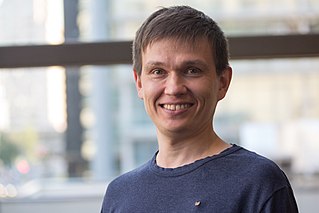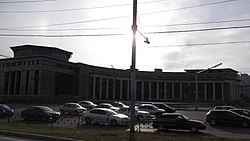
Tatarstan, officially the Republic of Tatarstan, sometimes also called Tataria, is a republic of Russia located in Eastern Europe. It is a part of the Volga Federal District; and its capital and largest city is Kazan, an important cultural centre in Russia. The region's main source of wealth is oil with a strong petrochemical industry.

Tatar is a Turkic language spoken by the Volga Tatars mainly located in modern Tatarstan, as well as Siberia and Crimea.

Kazan Federal University is a public research university located in Kazan, Russia.

Jan Niecisław Ignacy Baudouin de Courtenay, also Ivan Alexandrovich Baudouin de Courtenay, was a Polish linguist and Slavist, best known for his theory of the phoneme and phonetic alternations.

The culture of Tatarstan is molded from the culture of Volga Tatar people, Russian, and European culture.

The Volga Tatars or simply Tatars are a Kipchak-Bulgar Turkic ethnic group native to the Volga-Ural region of western Russia. They are subdivided into various subgroups. Volga Tatars are the second-largest ethnic group in Russia after ethnic Russians. Most of them live in the republics of Tatarstan and Bashkortostan. Their native language is Tatar, a language of the Turkic language family. The predominant religion is Sunni Islam, followed by Orthodox Christianity.

Yerevan Brusov State University of Languages and Social Sciences, is a public university in Yerevan, the capital of Armenia, operating since 1935. It is named after the Russian poet and historian Valery Bryusov since 1962.

Irkutsk State Linguistic University was a university in Irkutsk, Siberia in eastern Russia founded in 1948.
Tatar Encyclopaedic Dictionary is the first encyclopaedic dictionary published in Tatar language about history of Tatarstan and the Tatar people. The publication is produced by Tatar Encyclopedia Institute of the Republic of Tatarstan Academy of Sciences.

Kazan International Airport is an international airport in Russia, around 25 km southeast of Kazan. It is the largest airport in Tatarstan, and one of the busiest airports in Russia as well as in Post-Soviet States. Kazan International Airport served more than 5 million passengers in 2023. In 2019 Airport was renamed to commemorate a Volga Tatar poet, critic, publisher, and towering figure of Tatar literature Ğabdulla Tuqay.
Sergey Yefimovich Malov was a Russian and Soviet Turkologist who made important contributions to the documentation of archaic and contemporary Turkic languages, classification of the Turkic alphabets, and the deciphering of the Turkic Orkhon script.

Volgograd State University is a public university and one of the leading institutions of higher education in Volgograd, Russia.

Wszechnica Polska University of Applied Sciences in Warsaw is a private university located in Warsaw, Poland.

Elabuga Institute, a branch of Kazan Federal University, is a state educational institution of higher professional education of the Russian Federation.

Alexander Butlerov Chemistry Institute — structural unit of Kazan Federal University, carries out research, development and academic activity in the area of basic and applied chemistry.

Farhad Nail Fatkullin is a Russian social activist from Tatarstan best known for his activities in promoting the Wikimedia movement among non-Russian speaking peoples of Russian Federation. He was declared Wikimedian of the Year by Jimmy Wales during Wikimania 2018. He is a professional simultaneous interpreter previously serving for Mintimer Shaimiev, former President of Tatarstan.

Ymär Daher was a Tatar cultural worker, researcher, public servant, teacher and docent of turkology, doctor of philosophy and a vice judge. He moved to Finland in early 1900s.

Tatar literature consists of literature in the Tatar language, a Turkic language spoken in the Republic of Tatarstan in Russia. Tatar literature is a part of Tatar society and has been part of Tatar history since the existence of a Tatar state. Famous Tatar poets include Kasim Bikkulov, Ğabdulla Tuqay, and Näqi İsänbät.
Privolzhsky City District is a city district of Kazan, the capital of the Republic of Tatarstan, Russia. It occupies the southern part of Kazan. Its area is 115.17 square kilometers (44.47 sq mi). Population: 227,755 (2010 Census); 222,602 (2002 Census); 213,598 (1989 Soviet census).

Tatar nationalism is the belief that Tatars should constitute an independent nation. Finding historical basis in the Khanate of Kazan and Russian–Tatar enmities, Tatar nationalism has often synthesised Islam as a national aspect. Tatar nationalism has historically manifested itself as the Idel-Ural State, as well as the Declaration of State Sovereignty of Tatarstan and the country's period of de facto independence from Russia in the early 1990s.
















